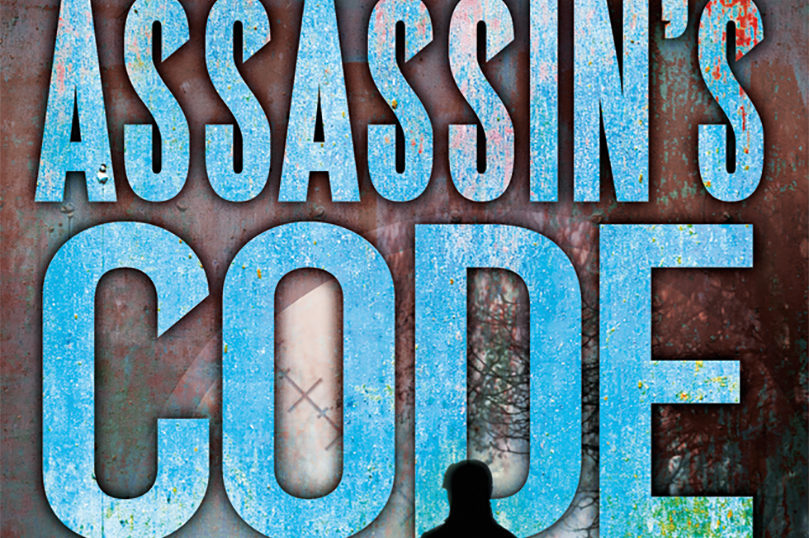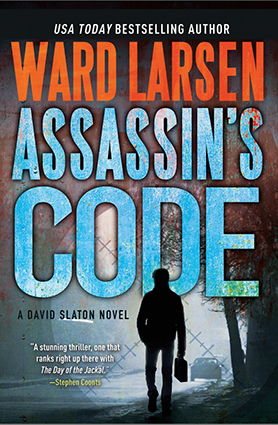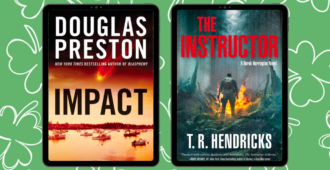opens in a new window opens in a new window
opens in a new window opens in a new window
opens in a new window opens in a new window
opens in a new window opens in a new window
opens in a new window opens in a new window
opens in a new window
Former assassin David Slaton discovers a cryptic message: on a memory stick, a photograph of the man who will soon assume command of DGSI, France’s elite counterterrorism force. With that country reeling under a wave of ISIS attacks, Zavier Baland will be trusted to make the Republic safe again. The problem—Slaton has seen Baland’s face before. He is Ali Samir, a terrorist Slaton is certain he killed fifteen years earlier. Unable to reconcile this frightening disconnect, he attempts to raise the alarm.
Thousands of miles away, the chief information officer of ISIS tries to keep networks running amid crumbling infrastructure. With the caliphate’s very survival at stake, the leadership commits to a last-ditch gambit: France must be attacked on a massive scale, forcing the West into the battle of the Apocalypse.
Slaton keeps a breakneck pace, traveling to Tel Aviv, Paris, and the deserts of Syria. In the end he uncovers a labyrinthine plot—and one that only he can stop.
Assassin’s Code will become available August 22nd. Please enjoy this excerpt.
1
To be a day short of one’s fifteenth birthday is a characteristically happy time in a young man’s life. Considerably less so when there is no chance whatsoever of reaching it.
He was sitting alone in the backseat of a rattletrap Citroën. Malika was in front, and next to her a man named Naseem was driving. He knew why she was in that seat. He would have been there too had their situations been reversed. His identity documents alleged him to be Youssef Aboud, and after six months of use the name almost seemed real. His true name was Jalil, but that, like so much else, had fallen to a distant memory. They’d insisted he use the new identity exclusively, beginning the day he had left home, all throughout his travels, and even after he was established in the safe house in Paris. They’d told him it was a manner of training. If he became Youssef Aboud, he would be less inclined to make a mistake under the duress of a roadblock or border crossing.
There had been a great many of those since last summer. His first journey had taken him from Gaza to Syria, and after a month in Raqqa, onward to Turkey and Greece. Then came a surprise detention on the island of Lesbos, and eventually he’d been shipped back to a Turkish refugee camp along the porous Syrian border. It reminded him of the child’s game Chutes and Ladders. Three steps forward, two steps back. The second time they put him on a plane to Budapest, where he was interned for nearly a month before being hauled back to Turkey on a bus. It was the southern route that succeeded: Turkey to Macedonia, followed by a leaky boat to Italy, and finally France. It was strange, he thought, how much persistence had been necessary to arrive where he was today—at the most foreseeable of all ends.
“We are nearly there, Youssef,” said Malika.
“My name isn’t Youssef,” he mumbled.
“What?”
“Nothing,” replied Jalil, his blank gaze pinned out the window. The day was cold and gray, which seemed predestined. Minutes ago they’d passed a great industrial complex, and Naseem had said something about it being the place where France did its research on nuclear weapons. He might have been trying to lighten the mood, or maybe distract Jalil. There was little chance of either. A second car was trailing behind them, although Jalil couldn’t see it. Three men with AK-47s who would go to work in the aftermath. A four-minute delay—long enough for the smoke to clear and the crowds to start gathering.
He shifted in his seat, the vest heavy on his shoulders. They’d made him wear a mock-up around the safe house in recent days, a duplicate item filled with sand. He’d tried to get used to walking with something near a normal motion. Today he wore a thick coat over the vest, the liner removed to make room. It all suited the day perfectly.
As they neared town a light snow began to fall, and for the first time since waking Jalil thought of something other than his fate. He’d not seen snow since he was very young, and he marveled at the flurries of white whisking past his window. He used a button to run down the window, and a few flakes whirled inside.
“What are you doing?” Malika snapped.
“Nothing,” he replied. “I only wanted some air.”
Silence fell for a time, until Naseem said, “You should pray one last time.”
“I will,” Jalil lied. He had been praying constantly for the last two days, or so it seemed. They told him it would be easier that way, help him follow the path of Allah and see the light of glory. They were wrong.
“There,” said Naseem.
Jalil looked out the window, and he saw a place every bit as foreign as Paris. He had spent nearly a month there, feeling as though he’d arrived on a different planet from the one that held Syria. They had let him go outside only once in that time, two nights ago when they’d taken him to a dreary bar, and made him smoke from a hookah and drink bourbon from a place called Kentucky. He also had a vague memory of an incredibly curvaceous woman, a prostitute he was sure, who told him in Arabic what she would do for him. The others all laughed. Jalil had found her more intimidating than erotic, and when he sent her away she’d called him a homosexual. Then everyone had gone back to the flat and passed out, and in the morning they all cleansed themselves and prayed.
This place was called Grenoble, and it had been a half-day drive from Paris. When they told Jalil this would be his target, he’d researched it on Malika’s phone while she slept. It was a midsized town, 150,000 people nestled in the foothills of the French Alps. Roughly the same number of inhabitants as Aleppo today—a city whose prewar population of two million had been on par with Paris itself. So much suffering. The others at the safe house argued constantly about who was to blame for Syria’s misery: France, Assad, the United States, Iran. All they could agree on was that someone had to be held accountable.
What does any of that matter now?
Jalil noticed one hand trembling ever so slightly. He gripped the door handle as hard as he could. The car began to slow as they reached the center of town. The city seemed alive. He saw red tram cars gliding over spotless streets, glittering decorations strung across storefronts. There were people all around. No, not people, he corrected—infidels and apostates. He saw smiling women and children, circumspect old men. A group of boys his age were doing tricks on their skateboards. Which should I kill to most please Allah? This was the question Malika had told him to focus on once he got out of the car. Such a strange question.
He was again marveling at the snow when a voice drifted in, the words not quite registering. “What?” he said.
“The drop-off point is just ahead,” Malika said. “Are you ready?”
He looked at her, thinking how different she looked now. He remembered playing tag with her, when she was a teen and he was just a boy. Malika had never let him catch her the way the other teenagers did. Today she was wearing Western clothing, wedged into pants and a blouse that were too small for her ample figure. Still, as he looked at her exposed hands and face, she reminded him of the pudgy little girl he’d once known. She was even wearing makeup today, although she’d assured him it was only to blend in. Naseem was wearing jeans and a hooded jacket like half the young men in France.
The Citroën pulled to a stop along the busy boulevard.
Malika turned in her seat, and Jalil met her gaze. She looked worried.
“Yes,” he said, his voice sounding distant and unfamiliar. “I am ready.”
“May Allah be with you.” She reached out a hand and he instinctively took it. The trembling was back—no matter how hard he tried, he couldn’t make it stop. It occurred to him that this was the first time she’d touched him since the halfway point of today’s journey, when they’d stopped on a desolate farm road. She had taken the vest from the trunk and helped him put it on. His hand still shaking, he looked at her with profound embarrassment as a tear streaked down one of his cheeks.
“It’s all right,” she said comfortingly. “You know how proud your mother will be.”
Jalil only nodded. He pulled away, and with a last glance at Malika he got out of the car. He shut the door and began walking away, only to hear a rapping noise from behind. He looked back and saw her banging the window harshly with her knuckles.
Jalil looked at her dumbly, unsure what she was trying to tell him. She rolled down her window and motioned for him to come over. Of course he’d done something wrong. He had always been that child, the one who needed correcting.
He went to her window, and after an exasperated glance, Malika took his right hand and reached into his jacket pocket.
“What are you doing?” he asked, anxiously looking over his shoulder.
Her face went stern, and Jalil gasped when she pulled the trigger out of his pocket and set it into his palm. It was the size of a cigarette pack—the kind of wired switch they used in America, he’d been told, to open and close garage doors.
“Did you listen to nothing Naseem told you last night?” Malika said sharply.
Only now did he remember—he’d been instructed to keep his hand on the device at all times once he was out of the car. He saw Naseem lean over and whisper into her ear, and Malika looked at Jalil with something new and terrible in her expression. With her hand over his, she guided the triggering device back into his right pocket. Then she pinched his fingers until the button sank.
He inhaled sharply and his heart stuttered. “Malika! What are you—” He couldn’t even finish the question. Jalil gripped the controller forcefully to keep the button from rising.
“Hold tightly!” she whispered. “Remember, it activates when you release the switch!”
He nodded, and felt her hand relax the pressure until he alone was holding the button down. She pulled back, and the window began rising. The last words he heard were from Naseem, a hushed “Allahu akbar!”
The car pulled away in an eddy of snow, and he turned toward the crowded shops and sidewalks. There were hundreds of people, grouped in front of store windows, moving on the sidewalks. Jalil took a tentative step, and when he did he heard a tiny metallic noise, then felt something tap his shoe. He looked down and saw a hex nut and two nails on the ground. Near panic, he looked around to see who was watching, the jingle of metal on cobblestone seeming like thunder. No one even glanced his way.
Jalil regulated his breathing, and focused completely on the switch in his pocket. He walked at a deliberate pace, trying to keep the movement of his upper body to a minimum. Trying to ignore the thumping in his chest. The second car would be nearby, three men waiting, sweaty fingers on triggers. Did they feel as he did now? Or was their faith so intense that it precluded any doubts?
His right hand had the switch in a death grip. He imagined his fingers going white from lack of circulation. And there, Jalil realized, was the measure of his life—how long could he keep a simple plastic button pinched between his fingers?
Why had Malika done it this way? Why had she forced him to squeeze the trigger and hold it? He had been briefed on one tactical reason to do it that way—if he thought he’d been identified, or if the police were near, he was to press the switch down as insurance. That way, if he was tackled to the ground or shot, merely letting go guaranteed success. But there had been no threats of exposure, no police nearby. Only now did Jalil understand: Malika didn’t trust him. She doubted he would go through with it.
They’d had a long talk last night, and he had expressed reservations. Certainly that was normal. He remembered this morning, when she’d told him his mother had already been given his martyrdom video. You must honor her today by giving yourself to Allah, Youssef. She had used the new name to tell him his mother was already mourning his death. How could any son not pay the debt of his mother’s grief? Malika had always been clever, the one who everyone knew would go places. And she might have, except that young girls in Palestine had but two possible destinations. One was marriage. The other was where she was at that moment—rushing to a safe house before another martyr was vaporized.
And not just any martyr.
He steeled himself and kept moving. He saw a café with awnings where smartly dressed couples enjoyed coffee and crepes, the smell of burnt sugar and vanilla hanging on the cool air. A clothing store with broad windows advertised the latest fashions. A tram went past with people inside shoulder-to-shoulder, probably as much for the warmth as to get anywhere. He’d been told to aim for a crowd, and to immerse himself as best he could. There was a small toy store, and he saw children coming and going with their parents. He couldn’t do that, although in Syria he’d met men who would, martyrs desperate for horror in their last act on this earth. Maybe Malika was right—maybe he was weak.
The snow came heavier, dampening the busy sounds and blurring brilliant lights. He kept moving. There was a park where an old woman was exercising two dogs. The dogs were chasing one another, tails wagging vigorously. A long line at the Häagen-Dazs shop snaked out across the sidewalk, but that didn’t seem right either. He’d always liked ice cream. Certainly more than Kentucky bourbon.
A crowd was gathering near a pavilion where a brass band was preparing to play. Jalil was so engrossed in his search for a target that he didn’t see the curb coming. He tripped and went sprawling forward. His left hand flew out of his jacket pocket, trying for balance, but to his credit his sweaty right hand never moved. Someone reached out and grabbed him by the arm to keep him from falling. They succeeded.
Jalil stood straight again, and turned to see a lovely young girl. Her hand was on his right forearm. Only inches from the switch. She was a few years older than he was, and wore a backpack with a baguette sticking out the top. She smiled and said something in French he didn’t understand.
His hand was shaking noticeably now, warm with moisture. He forced his fingers tighter but felt the muscles growing weary. When he straightened to his full height, he heard another tinkle on the pavement. This time it was noticed. He and the girl looked down at the same time. A screw and a few ball bearings rolled into the gutter. She looked up at him and must have seen the sweat on his face, the desperation in his eyes. She looked at the immobilized hand in his pocket. All at once she knew.
They both knew.
Her mouth went wide, and he thought, Please don’t scream. Don’t make me do it now.
And she didn’t.
Jalil watched her beautiful young face twist in primal fear. It was awful and frightening. Never in his life had anyone looked at him that way. They stood frozen for a time, seconds that felt like hours. Both stilled to inaction by what he might do. His hand began to cramp, and the first twitch came. Muscles no longer under his complete control. It seemed such a simple thing, to hold one’s fingers together. Any child could do it. He was squeezing so hard he thought the plastic switch might break. And if it did? What would happen then?
Of course he knew the answer.
“Run!” he whispered hoarsely in English. “Run quickly!”
His words seemed to register. She took one step backward, then turned and bolted away. No one seemed to notice. The world swirled around him as if he was its axis, a flurry of snow and cars and humanity.
His fingers ached.
Tears began streaming again.
He heard the girl scream in the distance.
Then the loud authoritative voice of a man.
Finally, the trembling in his fingers became uncontrollable. He closed his eyes, not wanting to know who or what was near. This was the moment he should have shouted with a martyr’s conviction. Allahu akbar! The words that came instead were in a level, conversational tone. They were meant for no one in particular. “My name is Jalil.”
In the next moment, the boy who had so long ago chased little girls in faraway streets gave his aching hand relief. He let go of the switch.
Copyright © 2017 by Ward Larsen
Order Your Copy
opens in a new window opens in a new window
opens in a new window opens in a new window
opens in a new window opens in a new window
opens in a new window opens in a new window
opens in a new window opens in a new window
opens in a new window







